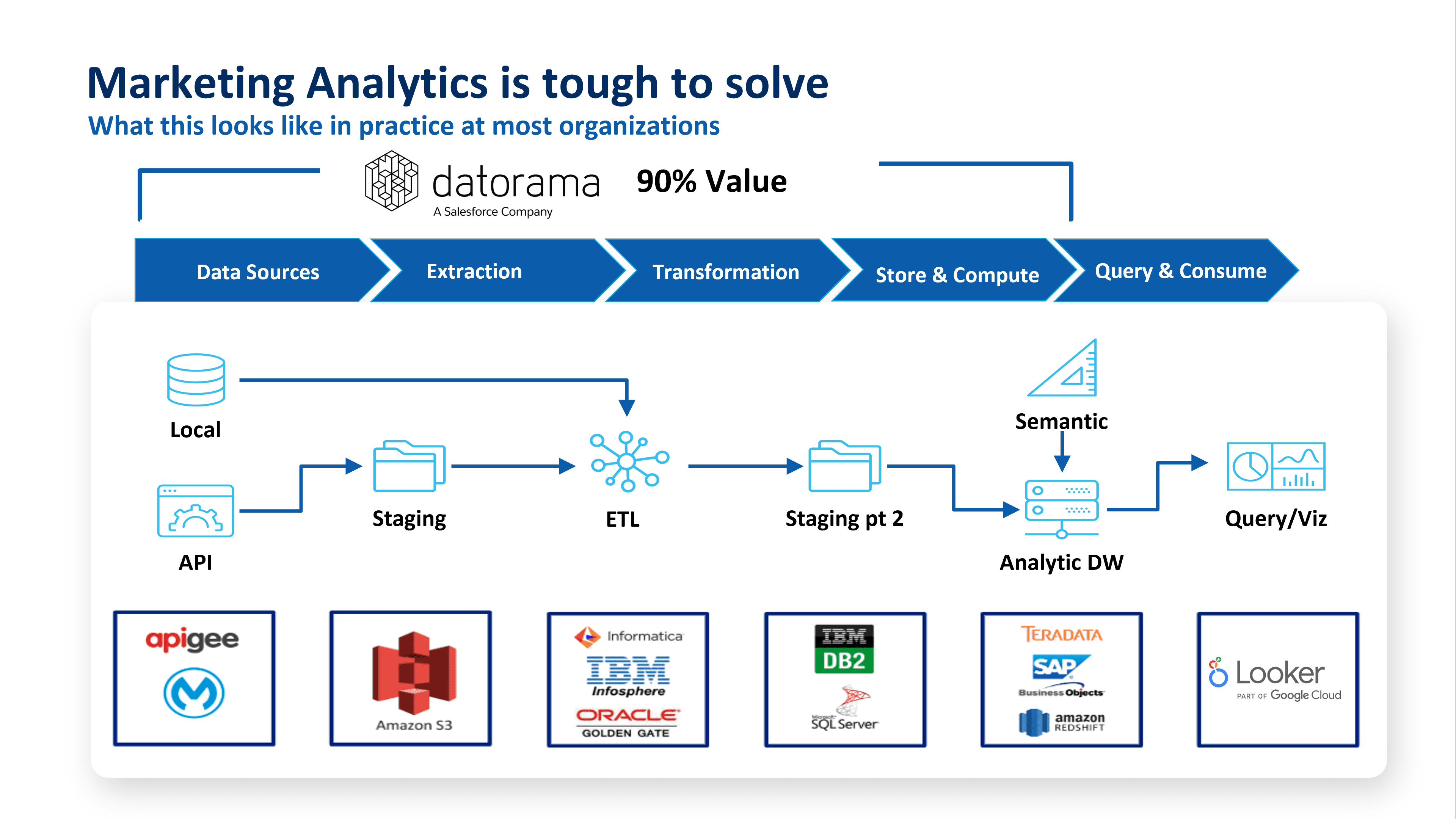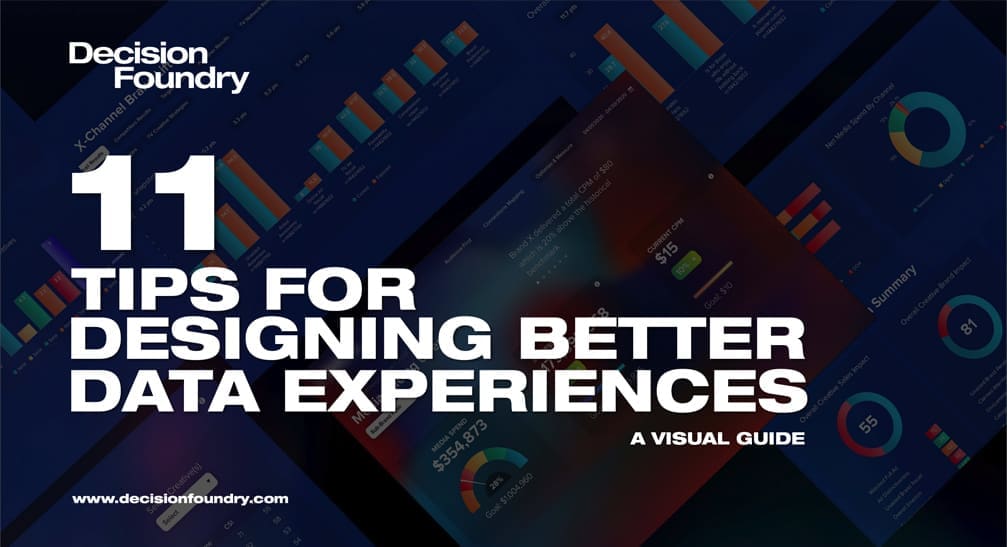Marketing Cloud Intelligence for Beginners
Whether client-side or agency, your organization has likely picked Marketing Cloud Intelligence, formerly known as Datorama, as its platform of choice for ETL support, client reporting and automated dashboards.
Solving Marketing Intelligence is Challenging
If you’ve been doing Analytics for any amount of time, you know that marketing data is complex, resource intensive and often, pricey to implement. Just ask your COO, Group Manager or that client who scrutinizes how much your time is being billed for reporting. You’ve turned to Marketing Cloud Intelligence to help you with automation, but there are often obstacles to overcome, particularly when your data stack supports multiple platforms, legacy systems, disparate IDs and a diverse set of stakeholders with varying financial and political interests. Or perhaps, it’s a ‘simple’ as finding the right API connection to facilitate your weekly reporting needs. In any event, you have choices ahead of you.

Technology Only Takes You So Far…
Now, you’ve been tasked with creating a solution that solves your client’s needs but also creates efficiencies in how you internally work with and activate data. This can be daunting. Marketing Cloud Intelligence is powerful, but like any platform designed to improve productivity, there’s a learning curve. If you are new, start with Salesforce Trailblazer and similar Datorama community resources to get there, faster. Hint, only a portion of this challenge can be solved through technology, alone.
Make a Plan or Plan to Fail
After using the platform for over 8 years and developing hundreds of client solutions, we’ve provided an outline for helping you get to know the platform, faster. As you build a culture around the use of Marketing Cloud Intelligence, there are 4 things you should consider as you plan a successful MCI roadmap.
#1 Success Begins with Strategy
Where do you begin and what are the crucial points to keep in mind while developing a flexible, scalable Datorama solution? As with any technical solution, the most important aspect is to be very specific about your requirements. What is it that your current system of reporting is lacking? What are you trying to achieve and how would you define success in 3, 6, 12 or even 18 months?
Knowing exactly what you need for your organization makes it infinitely easier to customize and use the platform for the future. Struggling to understand your audiences’ needs? Don’t try to develop your instance for the many. Instead, target the few (humans/users/stakeholders) who are most likely to benefit from or most likely to derail success. This may seem like an unlikely strategy, but our experience suggests this is the best course of action in driving that critical first 3 months of adoption. Try applying a little Data Empathy, and you’ll likely find success early and often. Miss this step and you’ll invite potential trouble for you and your organization.
We’ve provided a implementation checklist to help you think through this critical, first step. Start with your Data Strategy and you and your stakeholders will be happier in the long run. Be realistic in terms of understanding how long it wil take to document, build, deploy, train and optimize your solution. Remember that the the total cost of ownership goes beyond the platform license and your time. We strongly recommend you invest in a PM or Project Coordinator to keep you on task. Document and revisit your plan after every project milestone and be sure you have sign-off among Senior Leads, SMEs and other shadow stakeholders. When the time comes to communicate your success to your key stakeholders, you’ll have exactly what you need. Do this correctly, and you’ll potentially save yourself some grief.
#2 Data Mapping Matters
When APIs have every metric, dimension and frequency of data refresh you require, they can be ideal, but this is the exception, rather than the rule. Critical data to help you run your organization isn’t always neatly aggregated in a data pipeline. For this reason, Marketing Cloud Intelligence has Total Connect. Think of this as having available API functionality without the complex engineering requirements. This feature is one of the platform’s strongest and if custom data connectors are what you need, MCI supports Python, too. Practice using Total Connect to solve your messy data challenges and you’ll quickly require the knowledge to truly make your platform scalable.
#3 The Magic of Marketing Cloud Intelligence is in the Data Model
Salesforce Marketing Cloud Intelligence is a marketing analytics tool that is used for data integration, ETL (Extract, Transform and Load) and visualization. These are the three pillars around which an optimal reporting solution is built. The platform provides various features under each of these categories that can be organized to your specific data needs. In addition to this, the platform has a concrete data model, one that can be used to map incoming data in such a way that it can be easily harmonized and enriched to boost the value of campaign performance data collected across different data platforms.
To understand the underlying data model and the unique features of this platform, the certified, Admin Platform Exams service provided by Salesforce is a good place to start. This is ideal for someone who has a good understanding of the different kinds of data tracked on each platform and covers all the functionalities provided by the platform to ingest, harmonize and visualize this data. It may well be to your benefit to have a few people take the Datorama training, both for backup but also for cross-pollination of setup ideas.
#4 Data Stiching is Your BFF
Once you have an idea of what the platform has to offer, the next step is to outline the key objectives of the solution you are trying to build. One of Marketing Cloud Intelligence’s biggest advantages is its capability to automate tasks required to piece together marketing data tracked on various platforms. This is applicable to any marketing team that runs activities across multiple channels and is responsible for generating reports and/or providing a dashboard that combines data from these sources in a meaningful manner. There are a host of features that the platform offers to facilitate this. In order to automate any process, the manual way of performing it must be clearly defined. For example, you would create multiple ‘tasks’, which are essentially little mini-programs to each pull data from a different database. Then an overriding command task bundles them together, and the command task can be set to run on any schedule you like. The platform is equipped to automate almost any scenario that is designed in this manner. Other examples include linking delivery performance data with booking data, integration of analytics data with Ad server data, integration of viewability data with ad serving data etc. Watch our Mastering Datorama Fundamentals series to improve your understanding of onboarding, harmonizing and visualizing data.
The Value of Marketing Cloud Intelligence
Marketing Cloud Intelligence need not be just a tool used for dashboards and reports. Once data has been cleaned up and harmonised on the platform, you now have access to a unique database of your marketing information with KPIs (Key Performance Indicators) and breakdowns added to it that are otherwise not present on any data platform. This enriched, customized database can be exported from Marketing Cloud Intelligence for further uses other than client reporting.
Finally, the platform offers the capability to build visually informative and appealing dashboards. Custom CSS can be used to enhance the visuals of the dashboards that outmatch most off-the-shelf solutions.
The Admin Platform Exams cover the different kinds of widgets and functionalities provided. As it is so customizable, you can create the interface specifically to your stakeholders’ needs and lock out unnecessary functions. if needed. MCI has been designed specifically to fill in the holes in your data usage and make it easily accessible, and adjustable for users of all experience levels. You’ve selected Marketing Cloud Intelligence. This journey offers plenty of learning challenges and opportunities, but you’ve made the right decision. But, if you’re still struggling, help is available.
Good luck. Now, go build build better data experiences!




